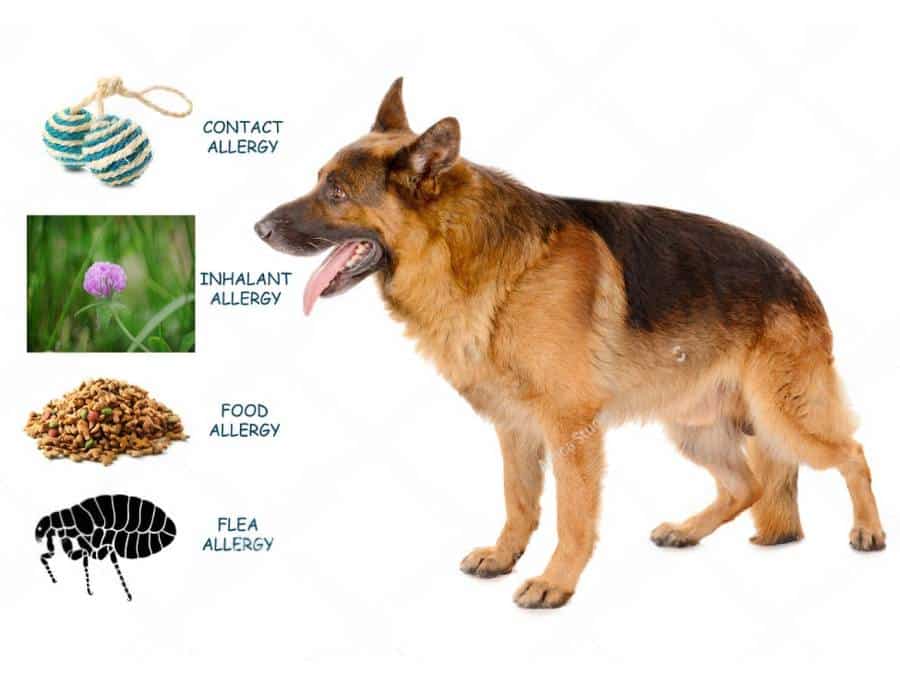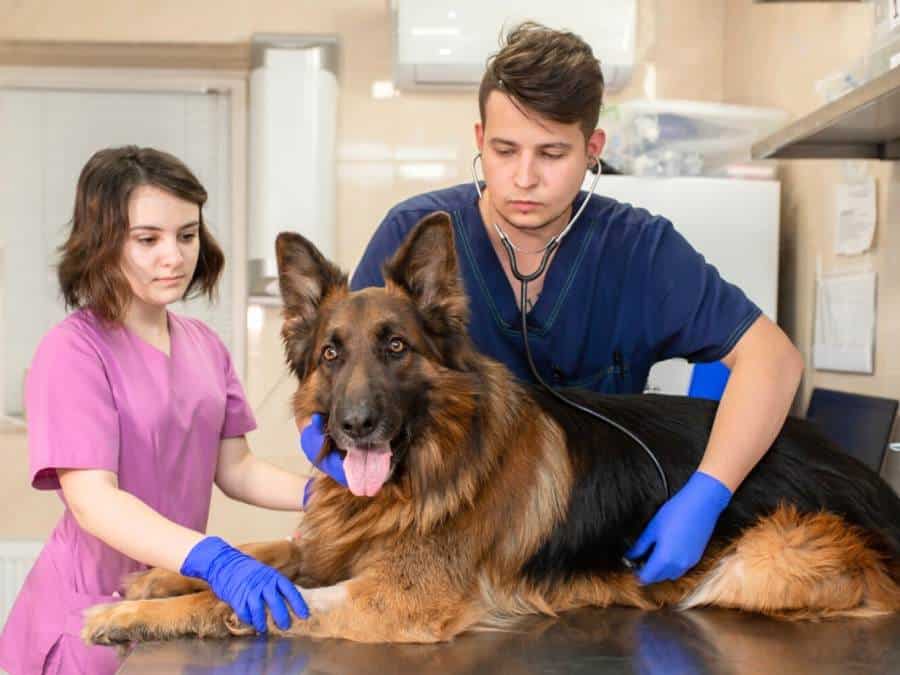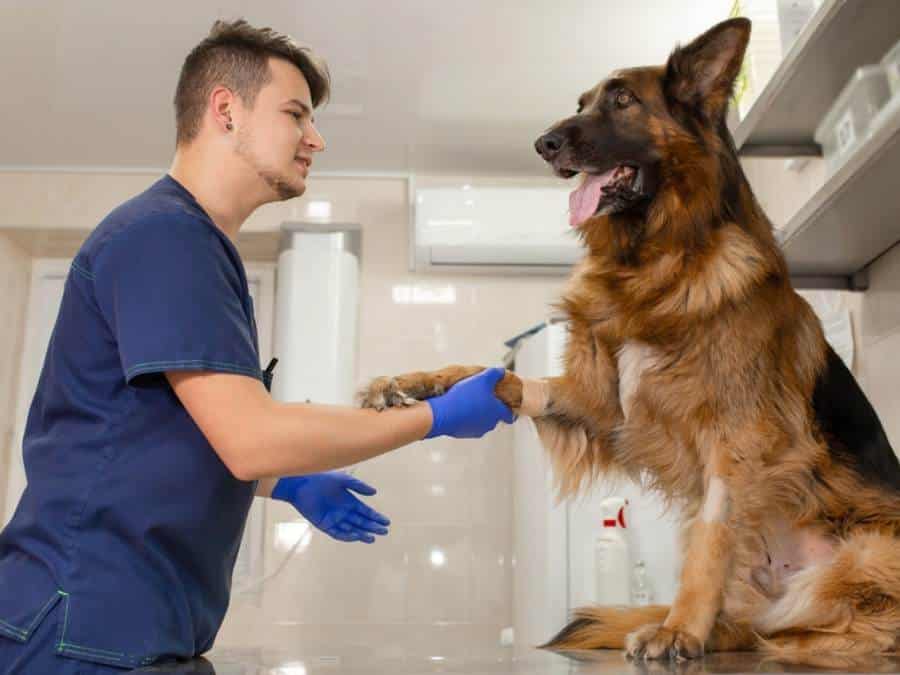From my own personal experience of handling allergies of my three German Shepherds, I can tell you that allergies can manifest in various ways in dogs. This may include reactions to certain ingredients in their food or contact with specific plants or products.
These allergic reactions can range from mild symptoms such as itching and skin irritation to more severe problems like respiratory distress.
So, in this article, we’ll discuss 6 common German Shepherd allergies, their symptoms, potential causes, and effective treatment options that can help alleviate your dog’s allergy-related issues.
Types of Allergies in German Shepherds
If you have a German Shepherd who seems to be experiencing allergy symptoms, it’s important to understand the different types of allergies they may face.
Below is a list of 6 common German Shepherd allergies, and in the next section of this article, we will discuss each of the allergy’s symptoms and treatments in detail.
- Flea Allergy Dermatitis (FAD): This is one of the most common allergies in dogs. Some dogs are hypersensitive to flea saliva, and even a single flea bite can cause intense itching and skin irritation.
- Food Allergies: Dogs can develop allergies to certain ingredients in their food, such as beef, chicken, dairy, wheat, and soy. Food allergies can manifest as skin problems, gastrointestinal issues, or a combination of both.
- Environmental Allergies (Atopy): Similar to human hay fever, dogs can be allergic to environmental factors like pollen, mold, dust mites, and certain grasses. This type of allergy often leads to skin itching, ear infections, and respiratory issues.
- Contact Allergies: Some dogs may be sensitive to certain substances they come into contact with, such as certain shampoos, cleaning products, or plants.
- Drug Allergies: Dogs can have adverse reactions or allergies to certain medications. It’s important to monitor your dog closely when starting a new medication.
- Insect Bite Allergies: Beyond flea bites, dogs can be allergic to the venom from insect stings or bites, such as those from bees or wasps.
RELATED: German Shepherd Itchy Skin Treatment
Symptoms of allergies in dogs can vary but often include itching, redness, swelling, ear infections, sneezing, coughing, or digestive issues.
Now let’s discuss each of these allergies in detail.
1. Flea Allergy Dermatitis (FAD)

Flea Allergy Dermatitis is caused by a hypersensitivity to the saliva of fleas. When a flea bites a dog, it injects saliva into the skin.
In dogs with flea allergy dermatitis, their immune system reacts strongly to the proteins in the flea saliva, triggering an allergic reaction.
Even a single flea bite can lead to intense itching and discomfort.
The symptoms of flea allergy dermatitis primarily involve the skin and can range from mild to severe. Common signs include:
- Intense Itching: Dogs with FAD often exhibit intense itching, especially around the tail base, back, and hindquarters.
- Hair Loss: Due to excessive scratching and biting, affected dogs may experience hair loss, especially in the areas where they scratch the most.
- Red and Inflamed Skin: The skin may become red, inflamed, and irritated. Secondary bacterial infections can also occur due to constant scratching.
- Hot Spots: Persistent scratching can lead to the development of hot spots—localized areas of inflamed and infected skin.
- Chewing and Biting: Dogs may excessively chew or bite at their skin, attempting to alleviate the itching.
Diagnosing flea allergy dermatitis involves a combination of clinical signs, medical history, and the presence of fleas or flea dirt on the dog. Flea dirt, which looks like small black specks, is actually flea feces containing digested blood.
In some cases, veterinarians may perform skin tests or recommend blood tests to rule out other potential causes of skin allergies.
RELATED:
How to treat FAD
- Flea Control: The primary and most crucial step in managing FAD is flea control. This includes regular use of flea preventatives such as topical treatments, oral medications, or flea collars. It’s important to treat not only the affected dog but also all pets in the household.
- Symptomatic Relief: To provide relief from itching and inflammation, veterinarians may prescribe or recommend medicated shampoos, topical creams, or sprays.
- Corticosteroids: In severe cases, corticosteroids may be prescribed to reduce inflammation and alleviate itching. These are often used for short periods due to potential side effects.
- Antihistamines: Some dogs may benefit from antihistamines to help control allergic reactions and reduce itching.
- Preventative Measures: Regular grooming, vacuuming living areas, and washing the dog’s bedding can help reduce the overall flea population in the environment.
It’s crucial for pet owners to work closely with their veterinarians to develop a comprehensive flea control plan and manage the symptoms effectively. Additionally, addressing and preventing flea infestations not only alleviates current symptoms but also helps in preventing future allergic reactions.
Also read: Common German Shepherd Health Issues: Symptoms & Treatments

2. Food Allergies in German Shepherds
Food allergies in dogs occur when the immune system reacts abnormally to certain ingredients in their diet.
According to this study, common allergens include proteins such as beef, chicken, dairy, eggs, and grains like wheat and soy.
Food intolerances, which are different from allergies, involve a non-immune response to certain ingredients and can also cause gastrointestinal issues.
The symptoms of food allergies in dogs can manifest in various ways, affecting the skin, digestive system, or both. Common symptoms include:
- Itching and Skin Irritation: Dogs may experience itching, redness, hives, or inflammation of the skin, often leading to excessive scratching or licking.
- Gastrointestinal Issues: Food allergies can cause vomiting, diarrhea, flatulence, and abdominal discomfort.
- Ear Infections: Chronic ear infections, characterized by redness, odor, and discharge, can be a sign of food allergies.
- Chronic Anal Gland Issues: Dogs with food allergies may have recurrent anal gland problems, leading to scooting or licking the anal area.
- Chronic Gastrointestinal Upset: Some dogs may exhibit chronic gastrointestinal issues without obvious skin symptoms.
RELATED: How To Treat German Shepherd Diarrhea
How to diagnose food allergies in GSDs?
Diagnosing food allergies in dogs can be challenging, and it often involves a process of elimination. The following approaches may be used:
- Elimination Diet: A veterinarian may recommend an elimination diet, where the dog is fed a novel protein and carbohydrate source (ingredients the dog has not been exposed to before) for a set period. If symptoms improve, potential allergens are then reintroduced one at a time to identify the specific trigger.
- Food Trials: Controlled food trials involve feeding the dog a hypoallergenic diet (limited ingredients) for a specific duration to assess the response.
- Blood Tests: Blood tests that measure specific antibodies can be used, but they are not as accurate as elimination diets and may yield false positives or negatives.
How to Treat Food Allergies?
Regular monitoring and adherence to dietary restrictions are essential for the long-term well-being of dogs with food allergies. Here are a few simple ways to treat food allergies in German Shepherds.
- Dietary Management: The primary treatment for food allergies is managing the dog’s diet. This may involve feeding a hypoallergenic or novel protein diet that avoids common allergens.
- Hydrolyzed Diets: In some cases, hydrolyzed protein diets may be recommended. These diets contain proteins broken down into smaller, less allergenic fragments.
- Avoidance of Allergens: Once the allergens are identified, strict avoidance is necessary. This includes avoiding treats, table scraps, and medications that contain the problematic ingredients.
- Medications: Veterinarians may prescribe medications such as antihistamines or corticosteroids to manage symptoms during flare-ups.
RELATED: German Shepherd Food Allergies: Symptoms & Treatments

3. Environmental Allergies
Environmental allergies, also known as atopy, occur when a dog’s immune system reacts to substances in the environment.
Common triggers include pollen from trees, grasses, and weeds, mold spores, dust mites, and certain fabrics.
Dogs may develop sensitivity to these allergens through inhalation or skin contact.
Symptoms
The symptoms of environmental allergies in dogs often involve the skin and respiratory system. Common signs include:
- Itching: Intense itching is a hallmark symptom. Dogs may scratch, bite, or chew at their skin, particularly around the face, paws, belly, and ears.
- Red or Inflamed Skin: Allergic reactions can lead to redness, inflammation, and sometimes the development of hot spots or sores.
- Ear Infections: Dogs with atopy may be prone to recurrent ear infections, characterized by redness, discharge, and an unpleasant odor.
- Watery Eyes and Sneezing: Respiratory symptoms such as watery eyes, sneezing, and nasal discharge may occur in some dogs.
- Licking or Chewing Paws: Dogs may exhibit excessive licking or chewing on their paws, which can lead to secondary infections.
RELATED: Why Does My German Shepherd Have Red Eyes?
Environmental Allergies Diagnosis
Diagnosing environmental allergies often involves a combination of clinical signs, medical history, and diagnostic tests. Common approaches include:
- Intradermal or Blood Tests: Intradermal skin testing or blood tests can help identify specific allergens that trigger the allergic response.
- Elimination Diet: If food allergies are suspected alongside environmental allergies, an elimination diet may be used to rule out dietary causes.
- Response to Treatment: If a dog shows a positive response to symptomatic treatment (such as antihistamines) or worsens during certain seasons, it may suggest environmental allergies.
How to Treat Environmental Allergies?
- Allergen Avoidance: Where possible, limiting exposure to known allergens can be beneficial. This may include keeping the dog indoors during peak pollen seasons, using air purifiers, and regularly cleaning the home to reduce dust mites.
- Topical Treatments: Medicated shampoos, conditioners, and topical sprays containing anti-inflammatory or soothing ingredients can help manage skin symptoms.
- Antihistamines: These medications can be prescribed to reduce itching and inflammation. However, their effectiveness varies among individual dogs.
- Corticosteroids: In severe cases, short-term use of corticosteroids may be necessary to control inflammation and provide relief.
- Immunotherapy (Allergy Shots): Allergy shots involve administering small amounts of the identified allergens to desensitize the dog’s immune system gradually. This is a long-term treatment aimed at reducing the severity of allergic reactions.

RELATED: How to Cure German Shepherd Dandruff
4. Contact Allergies
Contact allergies, also known as contact dermatitis, occur when a dog’s skin comes into direct contact with a substance that triggers an allergic reaction. (Source)
Common causes include certain plants, cleaning products, fabrics, grooming products, and topical medications.
Contact Allergies Symptoms
The symptoms of contact allergies primarily affect the skin and can include:
- Itching: Dogs may exhibit intense itching, scratching, or rubbing at the area that came into contact with the allergen.
- Redness and Inflammation: The skin may become red, inflamed, and sometimes develop small bumps or blisters.
- Hair Loss: Due to excessive licking or scratching, hair loss may occur in the affected area.
- Paw Chewing or Licking: If the allergen is on the paws, a dog may excessively chew or lick its feet.
- Ear Infections: Dogs may develop ear infections if they come into contact with allergens while scratching their ears.
Diagnosing Contact Allergies
Diagnosing contact allergies involves identifying the substance or material causing the allergic reaction. This can be challenging, as it requires a careful review of the dog’s environment and the substances it has been exposed to.
Common diagnostic approaches include:
- Elimination: Identifying and eliminating potential allergens from the dog’s environment to see if symptoms improve.
- Patch Testing: In some cases, veterinarians may perform patch testing by applying small amounts of suspected allergens to the skin to observe reactions.
- History and Observation: Detailed history-taking and observing the pattern of symptoms, such as whether they occur after exposure to specific materials or environments.
Contact Allergies Treatment
- Avoidance: The most effective treatment for contact allergies is to identify and avoid the specific substance causing the reaction. This may involve changing grooming products, avoiding certain plants, or using hypoallergenic bedding.
- Topical Treatments: Medicated shampoos, ointments, or sprays containing anti-inflammatory or soothing ingredients can help alleviate skin symptoms.
- Corticosteroids: In cases of severe inflammation, veterinarians may prescribe short-term use of corticosteroids to reduce itching and swelling.
- Antihistamines: These medications can be used to help control itching and reduce the allergic response.
- Protective Measures: If contact with a particular substance is unavoidable, protective measures such as using doggy boots or protective clothing can be considered.

5. Drug Allergies
Drug allergies in dogs occur when a dog’s immune system reacts negatively to a specific medication.
While dogs can tolerate many medications without adverse reactions, some individuals may develop an allergic response to certain drugs.
Common medications that can trigger drug allergies include antibiotics, non-steroidal anti-inflammatory drugs (NSAIDs), and vaccines.
Symptoms
The symptoms of drug allergies in dogs can vary widely and may include:
- Skin Reactions: Allergic reactions often manifest as skin issues, such as hives, itching, redness, or swelling.
- Gastrointestinal Distress: Dogs may experience vomiting, diarrhea, or abdominal pain as a result of a drug allergy.
- Respiratory Symptoms: Some dogs may exhibit coughing, wheezing, or difficulty breathing.
- Facial Swelling: Swelling of the face, particularly around the eyes or muzzle, can occur.
- Anaphylaxis: In severe cases, a dog may experience anaphylaxis, a life-threatening allergic reaction characterized by difficulty breathing, collapse, and shock.
RELATED: Why Do German Shepherds Pant So Much?
How to Diagnose Drug Allergies in German Shepherds?
Diagnosing drug allergies in dogs involves a thorough examination of the dog’s medical history and clinical signs. Common diagnostic approaches include:
- Elimination: If symptoms occur shortly after starting a new medication, discontinuing the drug and observing if symptoms resolve can help confirm a drug allergy.
- Allergy Testing: While specific tests for drug allergies are limited, a veterinarian may use skin tests or blood tests to rule out other potential causes.
- Challenge Testing: In some cases, a controlled reintroduction of the suspected drug under veterinary supervision may be performed to observe for allergic reactions.
Drug Allergy Treatments
- Discontinuation of the Medication: The primary treatment for drug allergies is to stop administering the suspected medication immediately.
- Symptomatic Treatment: Depending on the severity of the allergic reaction, veterinarians may prescribe medications to manage specific symptoms. For example, antihistamines can help alleviate itching and swelling.
- Emergency Care for Anaphylaxis: In cases of severe allergic reactions or anaphylaxis, immediate emergency veterinary care is essential. This may involve the administration of epinephrine, oxygen therapy, and other supportive measures.
- Avoidance of Suspected Drugs: Once a drug allergy is identified, it is crucial to avoid using that particular medication in the future. Veterinarians may note the allergy in the dog’s medical records to prevent accidental exposure.
RELATED: What Do German Shepherds Usually Die From?

6. Insect Bite Allergies
Insect bite allergies in dogs occur when a dog’s immune system reacts excessively to the venom or saliva injected by certain insects during bites.
Common culprits include bees, wasps, hornets, and ants. Some dogs may have a hypersensitivity to insect bites, leading to an allergic reaction.
Symptoms of Insect Bite Allergies
The symptoms of insect bite allergies in dogs can vary, and they often involve the skin or, in severe cases, systemic reactions. Common signs include:
- Localized Swelling: The area around the insect bite may swell, especially if the dog is allergic to the venom.
- Redness and Itching: The bite site may become red, and the dog may exhibit intense itching or discomfort.
- Hives or Rash: In some cases, hives or a rash may develop around the site of the bite or on other parts of the body.
- Pain or Discomfort: Dogs may display signs of pain, lameness, or discomfort, particularly if the bite is on a paw or a sensitive area.
- Systemic Reactions: In severe cases, dogs may experience systemic reactions, including difficulty breathing, vomiting, diarrhea, lethargy, or collapse. This indicates a potentially life-threatening condition and requires immediate veterinary attention.
How to Diagnose Insect Bite Allergies in German Shepherds?
Diagnosing insect bite allergies in dogs involves a combination of clinical signs, medical history, and sometimes, observation of the dog’s response to insect bites. Diagnostic approaches may include:
- History Taking: Veterinarians will inquire about the dog’s recent activities, any exposure to insects, and the onset of symptoms.
- Physical Examination: Examination of the bite site and any associated skin reactions can help in the diagnosis.
- Observation: If a dog has a history of insect bite allergies, veterinarians may observe their response to controlled exposure, such as placing a known insect nearby and monitoring for a reaction.
How to Treat Insect Bite Allergies?
- Localized Treatments: For mild reactions, localized treatments may include applying cold compresses to reduce swelling, using antihistamine creams, or administering oral antihistamines to alleviate itching.
- Systemic Treatments: In cases of more severe allergic reactions or systemic symptoms, veterinarians may administer corticosteroids to reduce inflammation and provide relief. Epinephrine may be necessary in cases of anaphylaxis.
- Preventative Measures: Preventing insect bites is essential for dogs with known allergies. This may involve avoiding areas with high insect activity, using insect repellents (safe for dogs) if recommended by a veterinarian, and keeping the dog indoors during peak insect seasons.
- Emergency Care: In cases of severe allergic reactions, immediate emergency veterinary care is crucial. This may involve administering medications such as epinephrine, intravenous fluids, and other supportive measures.
Conclusion
Taking care of a German Shepherd with allergies requires patience and dedication. By understanding the different types of allergies they can experience and working closely with your vet, you can make significant strides towards improving their quality of life. So roll up your sleeves, my friend, and embark on this journey to provide your beloved German Shepherd with the relief they deserve. You’ve got this!
FAQs
1. Can German Shepherds have allergies?
Yes, German Shepherds can have allergies, just like humans. They can be allergic to various things such as certain foods, environmental factors like pollen or dust mites, and even flea bites.
2. What are the common signs of allergies in German Shepherds?
Allergies in German Shepherds can manifest in different ways. Look out for symptoms like excessive itching, redness or inflammation of the skin, frequent ear infections, sneezing, coughing, watery eyes, and gastrointestinal issues such as vomiting or diarrhea.
3. How can I help alleviate my German Shepherd’s allergies?
To help your furry friend with allergies, you can take a few steps. Firstly, consult with a veterinarian to determine the specific allergens affecting your dog. They may recommend allergy testing or suggest an elimination diet. Keeping your home clean from potential allergens and using hypoallergenic grooming products can provide relief.
4. Are there any specific food allergies that affect German Shepherds?
German Shepherds are prone to food allergies just like any other breed. Common culprits include ingredients like beef, chicken, soy, wheat, and corn. If you suspect your dog has food allergies causing their discomfort or digestive issues, consider switching to a limited-ingredient diet or consulting with a vet for appropriate dietary recommendations.
5. Can I give over-the-counter allergy medications to my German Shepherd?
It is crucial to never administer over-the-counter medications without consulting a veterinarian first. Some human allergy medications contain ingredients that could be harmful or toxic to dogs. Your vet will guide you on safe and suitable options for managing your German Shepherd’s allergy symptoms.
Also read:




